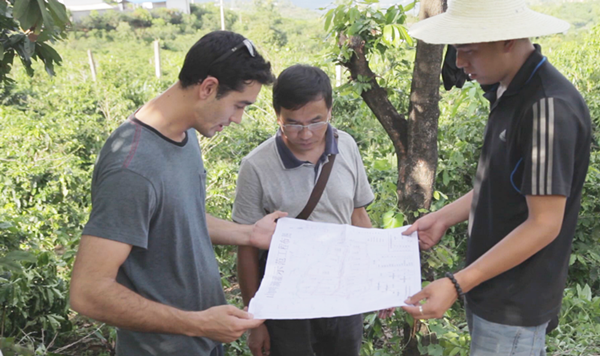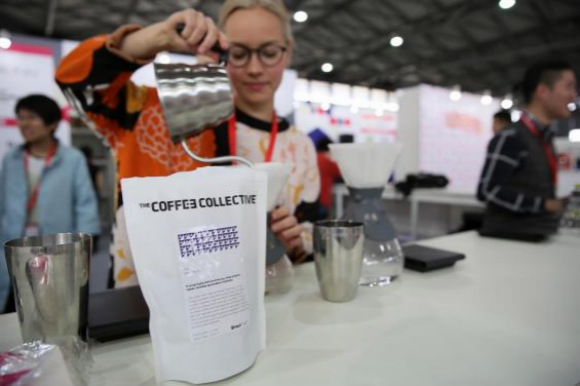"New Yorker" in Yunnan
In the novel lost Horizon by British writer James Hilton, four Western tourists break into the mysterious Shangri-La and experience a series of incredible events. This book has become the legendary Shangri-La, the "paradise" in everyone's heart.
In 2003, three "New Yorkers" also came to Yunnan. When they saw sacred snow-capped mountains, deep valleys, flying waterfalls and tranquil lakes surrounded by forests, their hearts were deeply attracted. So they gave up the comfortable life in the United States to stay here and decided to do something "sweet"-- to let the world know the beautiful Shangri-La again through the local honey and coffee in Yunnan.

Shangri-La Farm provides training for local bee farmers
"my family was traveling in Yunnan at that time, and because a cup of Yunnan coffee attracted our attention, my brother and sister embarked on a trip to explore local coffee in China," Sahra Malik (Chinese name: Sasha), a graduate of New York University and Central St. Martin's College in England, told reporters.
Sasha has three siblings. Her father, Khalid Malik (Khalid Malik) (Chinese name: Ma Heli), once served as the coordinating representative of the United Nations system in China and the representative of the United Nations Development Programme in China. When they were young, the three siblings stayed in several countries because their parents' places of work were constantly shifting. For them, home is the whole world.
Because his mother, Cattell Carter Malik, founded the Yunnan Mountain Heritage Foundation and the Shangri-La Handicraft Center in 2005. This gave the three brothers and sisters the opportunity to learn about Shangri-La and other parts of Yunnan, and they soon became familiar with the local geographical environment and characteristic agricultural products. After investigation and interview, they learned that Yunnan is not only rich in tobacco and tea, but also one of the five largest coffee bean growers in the world. In addition, many remote mountain areas in Yunnan are ecologically pollution-free areas, these lands are not polluted by tourism development or modern industry, and have the potential to develop and cultivate natural green agricultural products.
"most of the farmers I know in the mountainous areas of Yunnan can only feed their stomachs. In Shangri-La, for example, if they want to earn more, farmers can only subsidize them by digging up mountains to dig Chinese herbs such as matsutake and Cordyceps sinensis, but excessive excavation of matsutake and cordyceps is harmful to the ecology. Beekeeping can bring them sustainable income and reduce pressure on the environment. " Alia Malik, the second elder sister of the three siblings who majored in economics at Cambridge University, told reporters that because of the low technical difficulty and little impact on the environment, many countries in the world use beekeeping as a way to raise the income of residents in poor areas. They hope to help locals improve their quality of life by packaging and selling Shangri-La's all-natural honey.
To this end, in 2009, Sasha and Aria quit their high-paying jobs to start Shangri-La Farm, and later their younger brother Safi Malik (Chinese name: Ma Sanfei) joined in. Also because of their father's love for honey, Sasha and Aria regarded honey as the earliest and most important agricultural product of Shangri-La Farm.
As a social enterprise, Shangri-La Farm invited beekeeping experts to train local farmers in Yunnan in scientific beekeeping and provide new types of beehives. They buy high-quality coffee beans and honey from farmers at a price 2 to 5 yuan higher than the market purchase price, package them and put them on the market, and return 20% of their income to local farmers through the Yunnan Mountain Heritage Foundation to support the development of local undertakings.
Today, farmers from Shangri-La in Diqing Prefecture, Yunnan Province, and Yongsheng in Lijiang have joined the ranks of beekeeping. More than 10,000 bee farmers have cooperated with Shangri-La Farm, and six kinds of nectar have been produced. Shangri-La Farm has improved the health of queen bees and colonies through beekeeping program training. The honey output of the new beehive is 20% more than that of traditional methods, and through the fair trade purchase mechanism of Shangri-La Farm, each beekeeper can increase beekeeping income by more than 7000 yuan a year.
Aria told reporters that honey from Shangri-La Farm is collected only once a year, while in other places it is almost twice a year. To control the number of times to take honey, on the one hand, to ensure that the extracted is natural mature honey, and second, to give bees enough rest to ensure that they can produce the best honey.

Ma Sanfei popularizes drip irrigation technology for coffee planting
In addition to honey, Shangri-La Farm also produces and sells organic coffee from Yunnan. Shangri-La Farm has many different kinds of coffee, except Yunnan small grain coffee, some of which are coffee trees imported by brother and sister from coffee birthplaces around the world, and then grown organically on the farm, which can now produce four flavors of coffee. Sister Sasha told reporters that coffee from Shangri-La Farm is not only available in many supermarkets, but also employees of Google and Microsoft in Beijing and Shanghai drink Shangri-La Farm coffee at work.
In 2010, continuous drought in Yunnan greatly affected the yield and quality of coffee cultivation. Through personal fund-raising, the third brother Ma Sanfei helped coffee growing areas promote drip irrigation, eliminating the risk of having to wait another three to five years for coffee trees to be replanted after death. Li Dongming, a coffee grower in Baoshan, Yunnan Province, is one of the farmers working with Shangri-La Farm. "We coffee farmers are very grateful to Shangri-La Farm," he told reporters. They helped us to solve the problem of water shortage in the drip irrigation system, and we didn't pay a penny for the whole drip irrigation project. Now our output of coffee beans has increased by 30%, and the quality of coffee beans has become better. "
At the same time, Ma Sanfei contacted an European organic fertilizer manufacturer to set up a free pilot project for some coffee plantations to help farmers improve the output and quality of coffee beans. In addition, Ma Sanfei is actively participating in urban balcony planting and urban beekeeping projects to encourage urbanites to open up a small space to grow crops and raise bees to collect honey in addition to their limited living space and busy work and leisure. It is not only conducive to environmental protection, but also allows you to experience a green and organic way of life.
Today, Shangri-La Farm, in addition to organic honey and coffee, has also developed and produced a series of products such as organic jam, handmade soap and skin care products, which has achieved a healthy operation of production and sales. Mrs. Malik's Shangri-La Handicrafts Center is also helping locals increase their income. In addition, they have opened a free library in Shangri-La, and volunteers come here regularly to teach English to children. "We hope that through Shangri-La Farm, more people will be lifted out of poverty and children will have a chance to get a better education," Sasha said. We will make continuous efforts to let more people know us and make more contributions to society. "
Important Notice :
前街咖啡 FrontStreet Coffee has moved to new addredd:
FrontStreet Coffee Address: 315,Donghua East Road,GuangZhou
Tel:020 38364473
- Prev

The Secret of Cafe-- an investigation report on the budding and Development Environment of Youth organizations in Guangzhou (
Secret investigation report on the budding and Development Environment of Youth organizations in Guangzhou (excerpt) Shaoguan College team: Qiu Shaoyan Huang Dan Lai Yecheng Li Weizhen instructor: Zeng Baogan in many cafes in Guangzhou, we can often see some such people, they just order a drink, maybe add some snacks, and then sit for a long time, as if talking about something.
- Next

Finns who drink 10 cups of coffee a day will soon become "coffee spirits".
English tea, Finnish coffee. At the beginning of this year, Finns were ranked as the world's top coffee consumers by the International Coffee Organization, citing up to 12 kilograms of coffee a year, compared with 2.8 kilograms in the United Kingdom and 5.8 kilograms in Italy. This amount is about 10 cups of coffee a day, and usually hot black coffee with a traditional Finnish cinnamon roll can also be literally translated as slapping.
Related
- Can lightly roasted coffee beans be used to extract espresso? How finely should you grind high-quality coffee beans to make Italian latte?
- What is the difference between the world's top rose summer coffee and Yejia Shefi? What are the flavor characteristics of Yega Shefi coffee and Panama rose summer?
- The ceremony is full! Starbucks starts to cut the ribbon at a complimentary coffee station?!
- A whole Michelin meal?! Lucky launches the new "Small Butter Apple Crispy Latte"
- Three tips for adjusting espresso on rainy days! Quickly find the right water temperature, powder, and grinding ratio for espresso!
- How much hot water does it take to brew hanging ear coffee? How does it taste best? Can hot water from the water dispenser be used to make ear drip coffee?
- What grade does Jamaica Blue Mountain No. 1 coffee belong to and how to drink it better? What is the highest grade of Blue Mountain coffee for coffee aristocrats?
- What are the flavor characteristics of the world-famous coffee Blue Mountain No. 1 Golden Mantelin? What are the characteristics of deep-roasted bitter coffee?
- Can I make coffee a second time in an Italian hand-brewed mocha pot? Why can't coffee be brewed several times like tea leaves?
- Hand-brewed coffee flows with a knife and a tornado. How to brew it? What is the proportion of grinding water and water temperature divided into?

